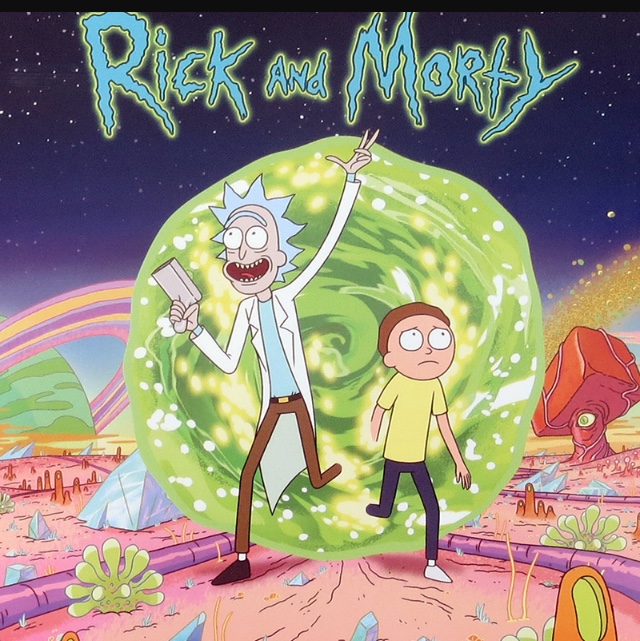Pop Between Realities, Home in Time for Tea: Rick and Morty
 On October 7th, 2017, just over two months after The Doctor Falls, police were called to several McDonald’s locations following a disastrous promotion in which the fast food restaurant brought back an obscure McNuggets dipping sauce, “Szechuan sauce,” that had briefly been released nearly twenty years earlier to tie-in with the release of Disney’s Mulan. The limited amount of sauce released to select McDonald’s was wildly insufficient for the crowds that arrived, which consisted of hundreds of people lining up for hours only to discover that restaurants had as few as twenty sauce packets. The result was bedlam—young men (the crowds were almost exclusively male) hurling obscenities and venting their frustration on minimum wage workers. On Twitter, people seriously suggested class action lawsuits and claimed that any workers who had a bad day deserved it because of the company’s bad actions.
On October 7th, 2017, just over two months after The Doctor Falls, police were called to several McDonald’s locations following a disastrous promotion in which the fast food restaurant brought back an obscure McNuggets dipping sauce, “Szechuan sauce,” that had briefly been released nearly twenty years earlier to tie-in with the release of Disney’s Mulan. The limited amount of sauce released to select McDonald’s was wildly insufficient for the crowds that arrived, which consisted of hundreds of people lining up for hours only to discover that restaurants had as few as twenty sauce packets. The result was bedlam—young men (the crowds were almost exclusively male) hurling obscenities and venting their frustration on minimum wage workers. On Twitter, people seriously suggested class action lawsuits and claimed that any workers who had a bad day deserved it because of the company’s bad actions.
The key bit of context needed to understand this madness is why McDonald’s was bringing back an ancient dipping sauce that Eater described as having “the color and consistency of strawberry jelly” and tasting “mainly like corn syrup with maybe a tiny bit of Worcestershire thrown in.” The answer is that several months earlier, when the third season premiere of Rick and Morty dropped unannounced on April 1st (so two weeks before The Pilot), the episode had culminated in a monologue in which Rick Sanchez, one of the two title characters, declares that his only real motivation in life is to eat that sauce again.
Well. Sort of. The more accurate description of what happens is that Rick stands above his grandson (Morty, the other eponymous character) as he cowers, whimpers, and sobs, angrily telling him that he deliberately broke up his parents’ marriage out of spite and to become “the de facto patriarch of your family and your universe” before threatening him if he ever tells anyone about this conversation and revealing his end goal of Szechuan sauce. It’s a genuinely distressing scene, in ways that are difficult to quite get a handle on. The distress is clearly intentional—the scene makes an active point of focusing on Morty’s fear and anguish, and on making the horror of what Rick is saying clear. But it’s also clear that the scene is meant to be funny, complete with Rick making a fourth-wall breaking claim that he’ll get the sauce “if it takes nine seasons.”
This tension is not so much common for the show as the nominal point. If you assert that Rick and Morty is a bad television show on Twitter, you will quickly be assured by somebody that the show is in fact a critique of Rick’s nihilism. This is an interesting claim. Certainly the claim that Rick and Morty is a highly intelligent show that is routinely misunderstood is common enough that a chunk of copypasta beginning “to be fair, you have to have a very high IQ to understand Rick and Morty” became a meme. And as the Szechuan sauce scene demonstrates, the show is open about the fact that Rick is a terrible person.…

 I want to start with an update to
I want to start with an update to  A thing we will inevitably have to address is what it looks like for Doctor Who to respond to Trump. Or, in the UK context, Brexit, but let’s go ahead and just use Trump as a metonym for the catastrophic politics that form the backdrop of the Moffat-Chibnall handover. This is, of course, something it is not fair to ask Class to do. It’s not fair to ask most of Series 10 to do it either—Trump’s election happened late in the block where they shot Oxygen and The Eaters of Light, which was in time to work the “too orange” gag into The Pyramid at the End of the World (although more on Trump and that episode when the time comes) but nowhere near early enough for anything in this season to be conceptualized as an intentional response to his Presidency. (His campaign is a different matter.) Even with Brexit, the vote took place four days after filming started—enough to have some impact (we know that Gatiss was considering an explicitly Brexit-themed script), but still fundamentally after the series was well underway. On the whole, Series 10 emerged from the midst of 2016’s turmoil; it is the Chibnall era that exists wholly and cleanly as a post-Trump work.
A thing we will inevitably have to address is what it looks like for Doctor Who to respond to Trump. Or, in the UK context, Brexit, but let’s go ahead and just use Trump as a metonym for the catastrophic politics that form the backdrop of the Moffat-Chibnall handover. This is, of course, something it is not fair to ask Class to do. It’s not fair to ask most of Series 10 to do it either—Trump’s election happened late in the block where they shot Oxygen and The Eaters of Light, which was in time to work the “too orange” gag into The Pyramid at the End of the World (although more on Trump and that episode when the time comes) but nowhere near early enough for anything in this season to be conceptualized as an intentional response to his Presidency. (His campaign is a different matter.) Even with Brexit, the vote took place four days after filming started—enough to have some impact (we know that Gatiss was considering an explicitly Brexit-themed script), but still fundamentally after the series was well underway. On the whole, Series 10 emerged from the midst of 2016’s turmoil; it is the Chibnall era that exists wholly and cleanly as a post-Trump work. Almost as soon as Doctor Who abandoned its post the world went to hell in a handbasket.
Almost as soon as Doctor Who abandoned its post the world went to hell in a handbasket. I’m not going to faff about pretending the justification for this involves Peter Harness’s chances of someday showrunning Doctor Who. I mean, I’d obviously love if that happened, but I don’t expect it (or think that we’re in a place to talk about who should succeed Chibnall yet anyway). No, the reason I’m picking this as our stopover reality between Last Christmas and the start of Series Nine is more idiosyncratic: having declared Harness’s debut the best Doctor Who story ever, I feel obliged to keep a bit of track of his work.
I’m not going to faff about pretending the justification for this involves Peter Harness’s chances of someday showrunning Doctor Who. I mean, I’d obviously love if that happened, but I don’t expect it (or think that we’re in a place to talk about who should succeed Chibnall yet anyway). No, the reason I’m picking this as our stopover reality between Last Christmas and the start of Series Nine is more idiosyncratic: having declared Harness’s debut the best Doctor Who story ever, I feel obliged to keep a bit of track of his work. It’s been a while since Toby Whithouse has entered our tale, and things have changed a lot since then. In the leadup to Twice Upon a Time Moffat joked that he’d had Whithouse write for every season, and the one time he didn’t he made him write two the next season. This is true, but obscures the fact that Whithouse contributed to the first half of the split Series Seven such that there were three full years between A Town Called Mercy and his next contribution. When A Town Called Mercy aired he still seemed like one of the most likely heirs apparent. There remain rumors that in the fuss about Moffat’s slower pace of production than Davies Whithouse had been offered the opportunity of stepping in as some sort of co-showrunner or to helm a single season, which he supposedly declined as the obviously poisoned chalice it was. And my past treatment of his work, going back to covering No Angels as a Pop Between Realities prior to School Reunion, has been rooted in the assumption that he’d probably get the job. Obviously that’s not what happened, though.
It’s been a while since Toby Whithouse has entered our tale, and things have changed a lot since then. In the leadup to Twice Upon a Time Moffat joked that he’d had Whithouse write for every season, and the one time he didn’t he made him write two the next season. This is true, but obscures the fact that Whithouse contributed to the first half of the split Series Seven such that there were three full years between A Town Called Mercy and his next contribution. When A Town Called Mercy aired he still seemed like one of the most likely heirs apparent. There remain rumors that in the fuss about Moffat’s slower pace of production than Davies Whithouse had been offered the opportunity of stepping in as some sort of co-showrunner or to helm a single season, which he supposedly declined as the obviously poisoned chalice it was. And my past treatment of his work, going back to covering No Angels as a Pop Between Realities prior to School Reunion, has been rooted in the assumption that he’d probably get the job. Obviously that’s not what happened, though. By rights, Moffat should have left. Sure, he’d done a season less than Davies, but it was clearly time. Each of his three seasons had been a step down from the one before, with Series Seven being an openly miserable experience. The Day of the Doctor and Matt Smith’s departure provided an occasion where he could leave on a high. His style had become exceedingly recognizable and recognized, which is the phase right before utter stagnation. It was time to go, and if he didn’t he risked—indeed, given the tenacity of his critics, essentially ensured—that there would be accusations that he stayed too long. But, of course, he didn’t. He retrenched, got a new star and executive producer, and went back to try again. This is the story of how that went, and of what may be Doctor Who’s most unexpected golden age.
By rights, Moffat should have left. Sure, he’d done a season less than Davies, but it was clearly time. Each of his three seasons had been a step down from the one before, with Series Seven being an openly miserable experience. The Day of the Doctor and Matt Smith’s departure provided an occasion where he could leave on a high. His style had become exceedingly recognizable and recognized, which is the phase right before utter stagnation. It was time to go, and if he didn’t he risked—indeed, given the tenacity of his critics, essentially ensured—that there would be accusations that he stayed too long. But, of course, he didn’t. He retrenched, got a new star and executive producer, and went back to try again. This is the story of how that went, and of what may be Doctor Who’s most unexpected golden age.
